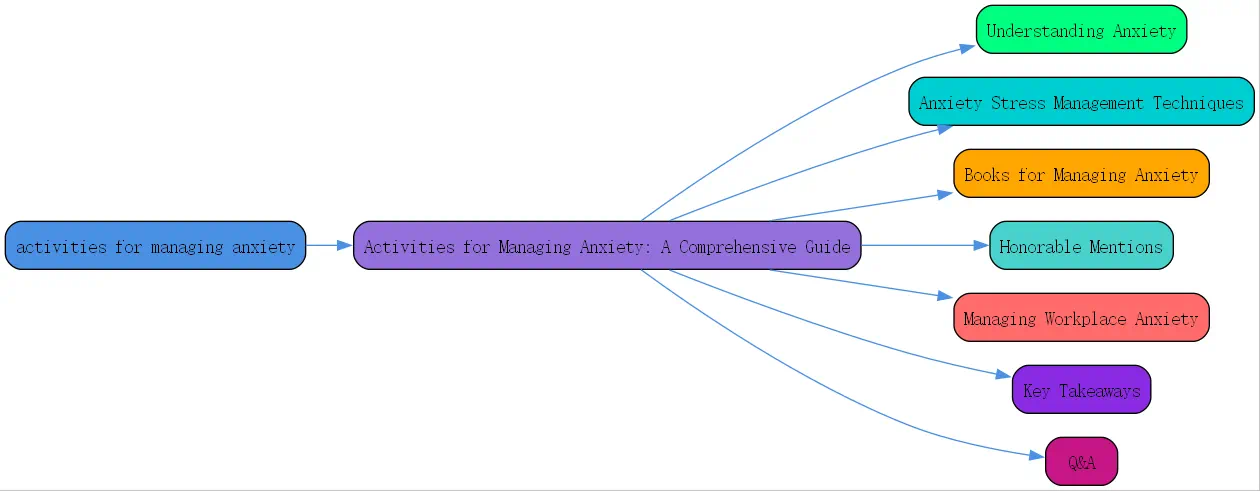Meta Description:
Discover effective activities for managing anxiety, curated stress management techniques, recommended books for managing anxiety, and strategies to handle workplace stress.
Activities for Managing Anxiety: A Comprehensive Guide

In today’s fast-paced world, managing anxiety has become increasingly essential for maintaining overall well-being. Whether it’s persistent worries, stress at work, or panic attacks, people are searching for actionable solutions to navigate life’s challenges. This guide explores practical activities for managing anxiety, top stress management techniques, a curated book list, and tailored strategies for addressing workplace anxiety.
Understanding Anxiety and Its Impact
Anxiety affects millions of people worldwide and can significantly disrupt daily life. Understanding its nature is the first step toward effective management.
Defining Anxiety and Its Effects on Daily Life
Anxiety is a mental health condition marked by excessive fear, worry, and unease, which can often lead to physical symptoms like fatigue, rapid heartbeat, and muscle tension. Left unmanaged, anxiety can interfere with relationships, productivity, and personal happiness.
Common Causes and Triggers of Anxiety
The causes of anxiety vary widely, but they often stem from genetic predisposition, traumatic experiences, stress from work or home life, and lifestyle habits. Triggers can include looming deadlines, financial stress, or even social interactions. Recognizing these triggers is crucial for addressing the root causes.
Recognizing Symptoms of Anxiety: Physical, Emotional, and Behavioral
Symptoms of anxiety range from physical manifestations, such as sweating and shortness of breath, to emotional signs, like irritability or restlessness. Behavioral symptoms include avoidance of triggers or engaging in repetitive rituals to cope. Early recognition helps prevent symptoms from worsening.
Anxiety Stress Management Techniques: Practical Strategies
Addressing anxiety often requires a combination of psychological tools, physical activities, and lifestyle changes. Below are effective stress management techniques.
Mindfulness and Meditation for Calming the Mind
Mindfulness focuses on being present, helping individuals observe anxious thoughts without judgment. Simple meditation practices, such as focusing on your breath for ten minutes, can dramatically reduce stress levels. The book Mindfulness for Stress Management: 50 Ways to Improve Your Mood by Robert Shaker emphasizes how mindfulness techniques can calm the mind during periods of high stress.
Breathing Exercises for Immediate Anxiety Relief
Controlled breathing exercises offer quick relief from anxiety. The “”4-7-8″” technique, for instance, involves inhaling for four seconds, holding the breath for seven seconds, and exhaling for eight seconds to signal relaxation to your nervous system. These exercises are especially useful when dealing with unexpected anxiety episodes or intense workplace pressures.
Physical Activity and Exercise for Reducing Stress Hormones
Regular physical activity decreases cortisol, the body’s primary stress hormone, and releases endorphins, promoting a more positive emotional state. Whether it’s yoga, jogging, or a quick walk, exercise plays an indispensable role in managing stress and anxiety. In Burnout: The Secret to Unlocking the Stress Cycle, the authors Emily and Amelia Nagoski highlight the significance of engaging in physical activity to release built-up tension.
Journaling: A Tool for Processing Emotions and Identifying Triggers
Writing down thoughts and feelings can provide clarity and insight into anxieties. Journaling offers a non-judgmental space to process emotions, identify triggers, and brainstorm coping mechanisms. This activity allows individuals to regain control over their mental space.
Creating a Supportive Environment and Seeking Social Connection
Developing a supportive community of friends, family, and mentors fosters emotional wellness. Sharing your feelings with trusted confidants alleviates stress and offers alternative perspectives to address challenges. Additionally, creating a relaxing environment閳ユ攩ree from clutter and distractions閳ユ攽romotes mental clarity and calmness.
Books for Managing Anxiety: A Curated List and Key Takeaways
Self-help books bridge the gap between therapy and personal reflection, offering insights into anxiety management. Below is a handpicked list of books with powerful takeaways for readers:
1. The Stress-Proof Brain by Melanie Greenberg
This practical book blends neuroscience, mindfulness, and cognitive therapy to teach methods for rewiring the brain to react to stress positively. Perfect for anyone looking to better manage emotional responses to tough situations.
2. Why Has Nobody Told Me This Before? by Dr. Julie Smith
An empowering guide filled with compassionate advice. Focusing on areas like self-esteem and social anxiety, it includes practical exercises you can apply to your daily life.
3. Mindfulness for Stress Management by Robert Shaker
This guide emphasizes mindfulness practices, such as body scans and gratitude journaling, to improve your mood and cultivate calmness, making it a great resource for those dealing with family or work-related stress.
4. Hardcore Self-Help by Robert Duff
Known for its raw honesty, this book provides straightforward, no-nonsense advice for tackling different types of anxiety in a highly relatable way.
5. Furiously Happy by Jenny Lawson
A humorous and heartfelt take on living with anxiety and depression, this book showcases how humor can serve as a survival tool and a force for emotional resilience.
Honorable Mentions
Books like The Anxiety and Phobia Workbook by Edmund Bourne and The Happiness Trap by Russ Harris combine cognitive-behavioral strategies and acceptance-based approaches to equip readers with actionable tools for taking charge of their mental health.

Managing Workplace Anxiety: Specific Strategies and Resources
Workplace anxiety is one of the most common stressors people face. Knowing how to handle it can not only improve your mental health but also bolster your productivity and career satisfaction.
Identifying Workplace Stressors and Triggers
Start by pinpointing what causes your anxiety. Is it deadlines? Overwhelming tasks? Social interactions during meetings? Maintaining a journal can help you document patterns and identify triggers.
Implementing Relaxation Techniques at Work
Mini mindfulness breaks or deep-breathing exercises can help de-escalate tension. Pausing for just five minutes between tasks to focus on calming techniques can reset your mental state.
Setting Boundaries and Prioritizing Tasks to Reduce Overwhelm
Avoid overcommitting yourself. Use time management tools to break down large projects into smaller, achievable steps. This reduces overwhelming feelings often tied to workplace pressure.
Communicating Effectively with Colleagues and Supervisors
Don’t hesitate to express your concerns with a trusted colleague or your supervisor閳ユ敄ransparency can lead to effective solutions. For example, if workload is causing stress, discuss the possibility of delegating tasks.

Seeking Support from HR or Mental Health Professionals
Finally, don’t overlook institutional support. HR departments can often provide resources or accommodations for mental health, including employee assistance programs (EAPs).
Key Takeaways
- Start Small: Activities like mindfulness, journaling, and breathing exercises are accessible ways to begin managing anxiety.
- Seek Knowledge: Books such as The Stress-Proof Brain and Why Has Nobody Told Me This Before? offer actionable advice and science-backed strategies for coping.
- Tackle Workplace Anxiety: Whether by setting boundaries or using EAP resources, addressing stressors at work can enhance both mental health and productivity.

Q&A
Q: Does reading self-help books truly help manage anxiety? A: Yes, reading books for managing anxiety can provide practical strategies, relatable experiences, and emotional support. Books like The Anxiety Solution by Chloe Brotheridge offer evidence-based approaches, while others, like Furiously Happy, use humor to explore how to live with anxiety. Ensure you choose books from credible authors to reap the maximum benefits.




